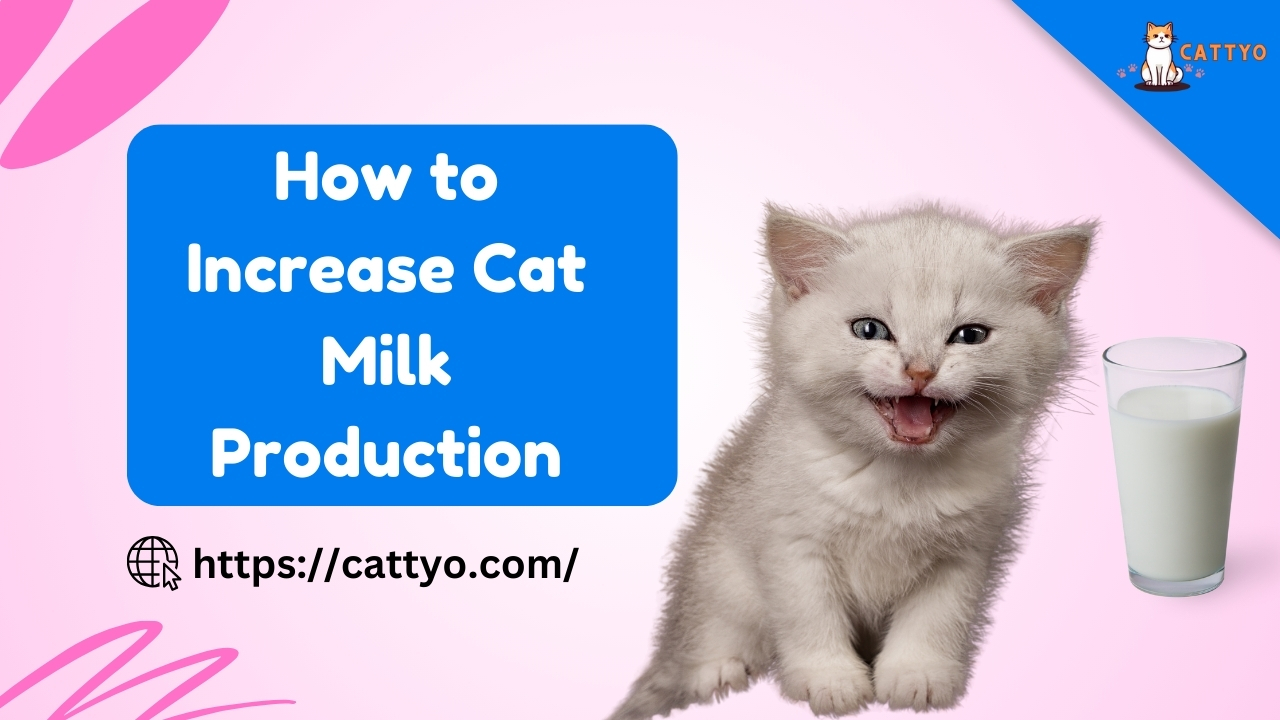We all know how precious a mother’s milk is for her newborn kittens. But what happens when your mama cat just isn’t producing enough? It’s every pet parent’s nightmare, right? You don’t want those tiny furballs going hungry. Luckily, there are ways to boost your cat’s milk production, and today, we’re diving into the “how-to” of it all.
Let’s talk about the basics first: why would a mama cat struggle with milk production? While a bit of a mystery at times, a cat’s milk production can be affected by stress, health issues, or even just the sheer number of kittens in the litter.
But don’t stress yet—there’s always something you can do to help. Here’s the scoop on how to encourage more milk, make sure those kittens are getting fed, and keep the cat family happy and healthy.
How To Increase Cat Milk Production:
If your cat isn’t producing enough milk for her kittens, it can lead to malnourishment and stress for both the mother and her babies. There are several ways to naturally boost milk production, from improving her diet to ensuring she’s relaxed and comfortable. Prompt intervention is key to maintaining the health of both the mother and her kittens.
- Increase Caloric Intake: Feed the mother high-quality, nutrient-rich food, especially kitten formula or wet food, which boosts energy and milk production.
- Hydration is Key: Ensure she has constant access to fresh water, as dehydration can decrease milk supply.
- Frequent Nursing: Encourage the kittens to nurse frequently, as regular stimulation helps the mother produce more milk.
- Minimize Stress: Keep the environment quiet and comfortable to reduce stress, which can hinder milk production.
- Veterinary Advice: If milk production doesn’t improve, consult your vet for potential underlying health issues or supplementation.
1. Nutrition: The Secret Sauce
You probably know this already, but we’re gonna say it again because it’s that important. Nutrition is key. Just like humans, cats need proper fuel to make milk. Think of it like this: no food, no milk. Simple, right?
What should you be feeding your mama cat?
Ideally, a high-quality kitten food. Sounds odd since she’s the adult cat, but kitten food is packed with extra calories, protein, and nutrients that support milk production. It’s like giving her a little boost of superpower.
But wait—what about wet food vs. dry food? Here’s the thing: wet food is often better because it’s more hydrating, and hydration is a big deal for milk production. A dehydrated cat won’t be making milk at full capacity. So, stock up on wet food or add some water to her dry food to keep her hydrated and happy.
2. Extra Snacks: More is More!
If your cat seems hungry all the time, don’t be surprised. Growing kittens take a lot of energy, and mama cat needs those extra snacks. Let’s face it, you wouldn’t want to work your tail off without a snack in between either, right?
Try offering her healthy treats throughout the day. Something like plain boiled chicken, turkey, or even a little bit of tuna can do wonders. And yes, I mean in moderation—no need to overload her with fatty treats.
But don’t forget the hydration part! A nice bowl of fresh water should always be available. Consider offering her a wet food snack a few times a day, especially if she’s nursing a large litter.
3. Stress? Get Rid of It!
Okay, let’s get serious for a sec. Stress is one of the sneaky little villains when it comes to milk production. If mama cat’s stressed, her milk production is going to suffer. Simple as that.
So, what can you do? Start by making her environment as calm as possible. If there are other pets in the house, keep them away from her and the kittens. Let her have some quiet time with her babies. You don’t need a quiet room with candles and soft music (unless that’s your thing), but definitely reduce noise and disruptions. Cats are creatures of habit, and a peaceful, secure environment helps them focus on their primary job—feeding those kittens!
4. Regular Nursing: The More She Nurses, The More She Produces
It’s a bit of a “chicken and the egg” situation here. The more the kittens nurse, the more milk mama cat will produce. It’s like a natural feedback loop. If the kittens are nursing frequently, it signals to her body that she needs to produce more milk.
If the kittens aren’t nursing as often as they should, you might need to step in and help. This could mean gently nudging them towards the mama or even trying to hand-feed the kittens with kitten formula (in an emergency). The idea is to get her body the signals it needs to ramp up production.
5. Her Health: Check For Underlying Issues
Let’s not overlook the obvious: sometimes, mama cat isn’t producing milk because there’s an underlying health problem. It could be hormonal imbalances, infections, or even simple fatigue. You wouldn’t ignore signs of illness in a person, and the same goes for your cat.
A visit to the vet is a must if you’re concerned about her milk production. They can check for infections (like mastitis) or other issues that could be slowing her down. Better safe than sorry, right?
6. Her Hormones: A Little Help from the Vet
Okay, so here’s the deal: sometimes mama cat’s hormones need a little nudge. If milk production is still sluggish even after all your efforts, you might want to have a chat with your vet about hormone therapy. Vets can sometimes prescribe medication that helps stimulate milk production, but this is typically a last resort.
Just remember, though, the best route is always natural! Stick with the tips above and only consider medication after consulting your vet.
7. The Power of Herbs and Supplements
Hold on—did someone say herbs? Yep! Some herbs are believed to help with milk production in cats. One of the most common ones is fenugreek. This herb is often used by lactating mothers (in humans, too!) to help boost milk production. But, here’s the catch: Always consult with your vet before you start any new supplements or herbs for your cat. Not all herbs are safe for pets, and you don’t want to cause any harm in your efforts to help.
Quick Tips Table: How to Boost Milk Production in Cats
| Tip | Description | Why It Helps |
|---|---|---|
| High-Quality Kitten Food | Feed your cat specially formulated kitten food. | High in protein and calories to support milk production. |
| Frequent, Healthy Snacks | Offer healthy treats, like boiled chicken or tuna. | Extra nutrients help replenish mama cat’s energy. |
| Provide Fresh Water | Keep water always available, or add water to dry food. | Hydration is key to milk production. |
| Reduce Stress | Create a calm and quiet environment for mama cat and kittens. | Stress can inhibit milk production. |
| Regular Nursing | Ensure kittens nurse often and encourage frequent feedings. | Stimulates the production of more milk through demand. |
| Consult with a Vet | Check for health issues or infections. | A vet can help rule out any medical reasons for low milk. |
| Herbal Supplements (Optional) | Talk to your vet about fenugreek or other herbs. | Some herbs may naturally encourage milk production. |
FAQs:
Q: How often should my cat nurse her kittens?
A: Ideally, kittens should nurse every 1-2 hours during the first week of life. After that, they’ll typically nurse every 3-4 hours.
Q: What should I do if my cat isn’t producing enough milk?
A: First, check her diet and hydration, reduce her stress, and ensure she’s nursing regularly. If that doesn’t work, consult your vet for advice on supplements or hormone therapy.
Q: Can I supplement the kittens’ diet if mama’s milk isn’t enough?
A: Yes! If your cat isn’t producing enough milk, kitten formula is a great option. Never give them regular cow’s milk—it’s not suitable for kittens and can cause digestive issues.
Q: Are there any signs that my cat might have a milk production problem?
A: If the kittens are constantly crying, aren’t gaining weight, or seem weak, mama might not be producing enough milk. Other signs can include swelling, redness, or discomfort in her breasts.
Conclusion: Keeping Mama Cat and Kittens Healthy
So, there you have it! A balanced diet, reduced stress, and frequent nursing are the cornerstones of boosting your cat’s milk production. Just remember, being patient and giving mama cat the right environment and nutrition will usually do the trick. But if things aren’t going as planned, don’t hesitate to get a vet involved.
In the end, we all want what’s best for our furry friends, and with a little extra care, you can make sure both mama and her kittens thrive.





